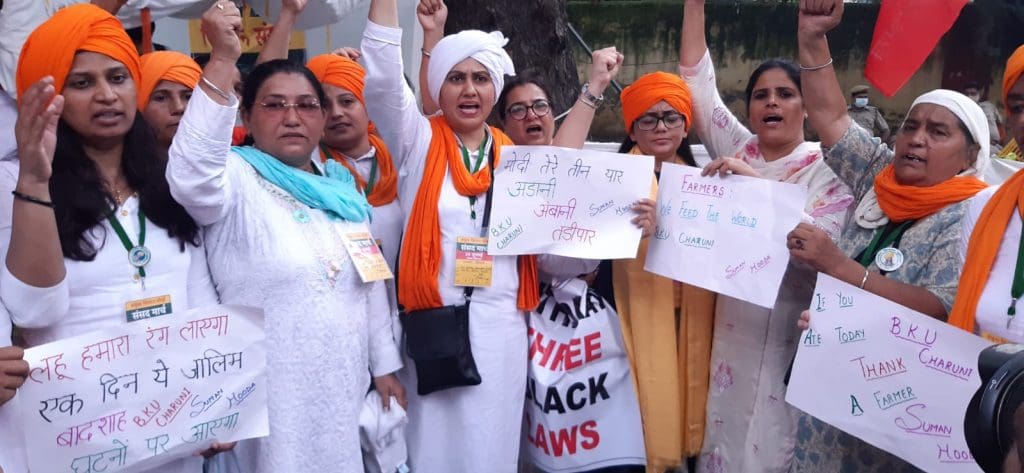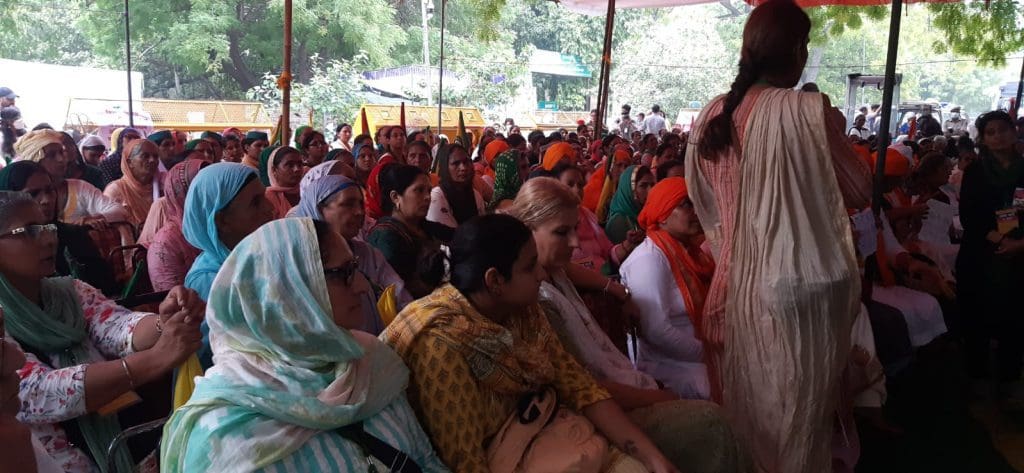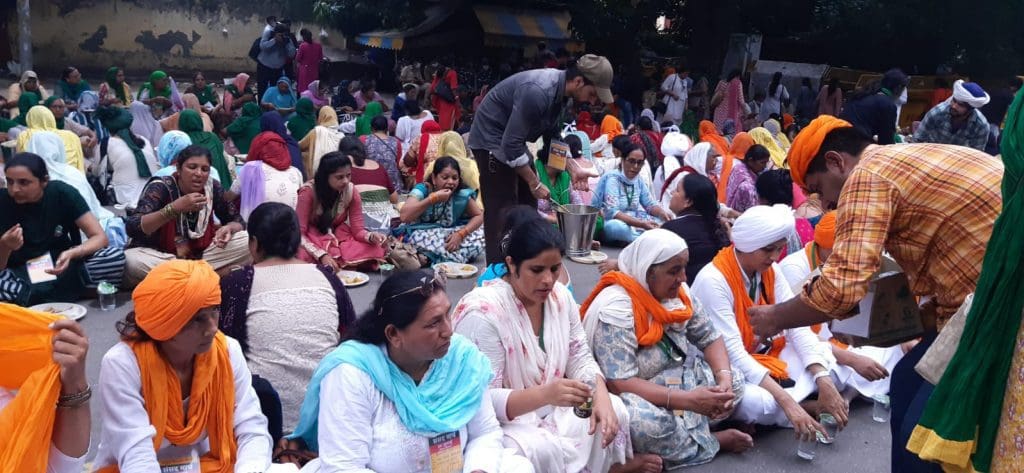
Manbir Kaur, 27, is irked by Union Agriculture Minister Narendra Tomar who told the parliament last week that government has ‘no record’ of farmer deaths during the protest.
Kaur is one among the fearless faces at the Mahila Sansad, a makeshift parliament organised by the women protestors to mark eight months of protest against farm laws.
200 women, allowed by the Delhi government, reached Jantar Mantar from Singhu border for the historic event on Monday, to press their demands to repeal three farm laws introduced last year.
“I will provide him with records of farmers who died at the protest site,” Kaur told Maktoob, slamming the insensitive comments. The MBA graduate quit her well-paying job to join the protest, deemed as one of the largest protests in human history.
She says there is nothing greater than ‘this cause’.
About 546 farmers lost their lives during the protest that besieged India’s capital since November 2020.
Farmers are holding ‘Kisan Sansad’ at Jantar Mantar till August 9 between 11 am and 5 pm, a kilometre away from parliament where the monsoon session is underway.
“We are not here because we are someone’s wife, daughter or sister. We are here as farmers. People need to stop considering us as secondary protestors.”, says activist Navkiran Natt who returned to the protest site after battling COVID.
Eight months, resilient
Camping in makeshift camps on tractors, protestors braved the scorching sun, deadly winter and massive monsoon in the eight months, defying intimidation from the central government. However, women had to bear more.
The absence of toilets in the initial days, painful menstrual cycles, and the patriarchal norms burdened female protestors, who overlooked the struggle to fight their cause. They took turns in managing households in the village to stay at the protest site to exercise their right.
“They don’t want to bring women into the political discourse because if they do, the conversation will be about women.”, says Ms Saima Khan, who has been on the protest site for the past eight months.
The protest started in September last year, days after India introduced three new farm laws which throw farmers at the ‘mercy of the corporates’. After two months of protest in the state of Punjab, thousands of farmers marched to Delhi in the last week of November and camped out in the borders.


Farmers across India came in solidarity with the protest organised by a consortium of farmers’ groups.
In the Mahila Sansad sat 46-yr-old Ms Ramesh Antil, who lost her husband — Satish Kumar — in the protest. He died of a heart attack a few days after the Republic Day violence.
“Police fired tear gas on us, it was my turban that saved me that day otherwise I would also have died. After 15 days of my husband’s death, I was back at the site. Modi might have his police but we have our spirits.”
Women farmers- Unpaid and Undervalued
Nearly 75% of the full-time workers on Indian farms are women, according to an Oxfam report. In a given crop season, when fields are sown and harvested, women farmers in India work about 3,300 hours, double the 1,860 hours their male counterparts put into farming.
Yet their work feeding their families and the country remains undervalued and largely overlooked.
“We are not weaker, we have been marginalized. This protest is an eye-opener for not just the society but even the male-dominated leadership in farmers unions, we are expecting change from their side as well”, says Ms Ainnie Raja, General Secretary, National Federation of Indian Women and Member, All India Kisan Sabha.
Recently, Union Minister Smriti Irani said she is “very concerned” about the well-being of women farmers protesting at Delhi borders. She asked women to go home along with children, keeping in view severe weather conditions. The protestors retaliated calling out the BJP leader’s ‘tactics to suppress the movement’.
“If she was genuinely concerned, they must repeal the law,” women at the Sansad told Maktoob.
‘This protest is no longer about farmers or agriculture. We have witnessed this government’s oppression in the past”, expresses Natt. “Now they have come for us and are set to snatch away the only thing we were left with- Our land. If we don’t fight now, we would be left with no means to survive”.
Tillers without Title
“The fight for land ownership here is two-fold for women. One, from the corporate and other from the patriarchal institutions due to which land rights have got concentrated in the hands of males,” Natt argues.
“After fighting against corporations here, we would have to vouch for our right against the patriarchal institutions in our villages to ask for our share. But I guess, that struggle is easier than fighting against corporates”.
Land ownership is a major concern with the introduction of the three farm laws as they facilitate the leasing of land from small farmers by corporations. This has created tensions about the vulnerability of land ownership of farmers. The issue becomes all the more important for women who despite engaging in around 80% of farm work, women own only own 13% of the land, as stated in a report by Oxfam.


Over 90% of agricultural land in India is transferred through inheritance. Patriarchal norms of transfer of property to sons, leave women stuck as labourers for generation after generation, tilling their land with no title.
Land ownership diminishes the threat of forced eviction or poverty and boosts women’s bargaining power in the home due to economic independence. The farm laws may also hurt women’s ability to resolve agricultural disputes with powerful corporations.
Young or old, In solidarity against power
Mahila Sansad raised concerns about women whom society fails to recognise as ‘farmers’. A 43-yr-old Manjeet Kaur says, “Sadda chulha band krdae modi – Modi is going to shut my kitchen.” Manjeet is a homemaker and says the farm laws’ induced inflation will make it difficult to buy basic ingredients to cook a meal for her family.
17-yr-old Raman, and 20-yr-old Harvinder Kaur, were the youngest protestors seen at the Mahila Sansad. The girls say, “we walked 100kms from Panipat to Delhi in five days to join the protest.” We passed through the villages to shorten the distance but our feet got bruised and sore for days.
“We have united once again. We were all lost in our lives but the movement has revived the real spirits of our nation- to exercise our right to speech and speak truth to power. Their hate won’t work,” Khan added.
Raman says, “ Sadda vi dil keda asi bi modi ke khilaf ladai lad di. Modi hathiyara hai. Our heart also says we have to fight against Modi. He is a hunter.”



